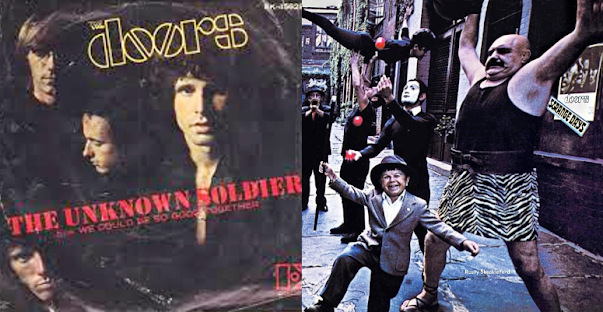THE "STRANGE DAYS" LP’S AFTERMATH: "THE UNKNOWN SOLDIER"
The Doors' second album, "Strange Days", was released on September 25, 1967. It reached number two on the U.S. album chart.
Soon after the release of this LP, Jim Morrison's incredible
creativity conceives another song, completely different in structure from
anything that had been put on the market up to that time by any band.
It was "The Unknown Soldier", which
will become the first single taken from the Doors' next album ("Waiting
For The Sun").
This great song was released in March '68, with "WeCould Be So Good Together" as the B-side (another track that would end
up on "Waiting For The Sun"). It was recorded in November 1967, an
element that implicitly indicates its composition in the immediate period
following the release of "Strange Days".
The structure and features of this song originate from
the experience gained by The Doors during the recording of "Strange
Days", when the group had been able to spend more time in the recording
studio.
There, they tried out new instruments, sound effects,
distortions and experimented freely. Doing so, they developed the taste for new
musical possibilities given by sound engineering that so innovatively
characterize "The Unknown Soldier".
During the recordings of “Strange Days” The Doors
found out a whole new set of sound experimentations. They swiftly used this
discovery to take a step further and create something unheard before: “The
Unknown Soldier”.
The tune was the first example in the history of
modern music that includes a scene acted by a musical group. In fact, the
central part of the song included sounds and voices without involving any kind of
music.
It was an extremely daring and innovative move,
capable of combining music and theater in the same musical context in a smooth
and fascinating way. A move which couldn’t be possible without the sound
developments The Doors went through during the “Strange Days” sessions.
This track will not have much luck on the charts
compared to its high quality, stopping at a disappointing 39th place.
Nevertheless, it remains to this day a rare example of politically engaged
Psychedelic Rock mixed with theatre performance and unprecedented bold studio innovations:
a great musical experience originated from the “Strange Days” immediate artistic
and musical aftermath.




Comments
Post a Comment